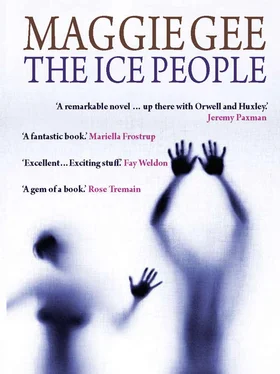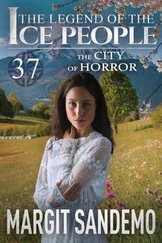Maggie Gee - The Ice People
Здесь есть возможность читать онлайн «Maggie Gee - The Ice People» весь текст электронной книги совершенно бесплатно (целиком полную версию без сокращений). В некоторых случаях можно слушать аудио, скачать через торрент в формате fb2 и присутствует краткое содержание. Год выпуска: 2008, Издательство: Telegram Books, Жанр: Фантастика и фэнтези, на английском языке. Описание произведения, (предисловие) а так же отзывы посетителей доступны на портале библиотеки ЛибКат.
- Название:The Ice People
- Автор:
- Издательство:Telegram Books
- Жанр:
- Год:2008
- ISBN:нет данных
- Рейтинг книги:4 / 5. Голосов: 1
-
Избранное:Добавить в избранное
- Отзывы:
-
Ваша оценка:
- 80
- 1
- 2
- 3
- 4
- 5
The Ice People: краткое содержание, описание и аннотация
Предлагаем к чтению аннотацию, описание, краткое содержание или предисловие (зависит от того, что написал сам автор книги «The Ice People»). Если вы не нашли необходимую информацию о книге — напишите в комментариях, мы постараемся отыскать её.
imagines an ice age enveloping the Northern Hemisphere. It is Africa’s relative warmth that offers a last hope to northerly survivors. As relationships between men and women break down, the novel charts one man’s struggle to save his alienated son and bring him to the south and to salvation.
Maggie Gee
The White Family
The Flood
The Ice People — читать онлайн бесплатно полную книгу (весь текст) целиком
Ниже представлен текст книги, разбитый по страницам. Система сохранения места последней прочитанной страницы, позволяет с удобством читать онлайн бесплатно книгу «The Ice People», без необходимости каждый раз заново искать на чём Вы остановились. Поставьте закладку, и сможете в любой момент перейти на страницу, на которой закончили чтение.
Интервал:
Закладка:
‘What’s happening?’ Luke was out of the car, rubbing his eyes, pulling on his trousers.
‘Some mangy wolves. I saw them off.’
‘Wolves?’ he said. ‘Like in the books?’
And before I could stop him he had darted outside.
The next thing I remember we were both outside. Away from the fire the cold made my eyes water, Luke was trapped by a ragged ring of animals, eight or nine, maybe more, dark weaving bodies, all snarling and growling and running at him, shearing off to the side at the last moment, but getting bolder, corning closer, he was dancing about and shouting at them, but he’d suddenly had enough, I could see, he was yelling for me, ‘Dad, Dad!’ and in a great slithering rush on the snow I came running into the middle of them, kicking out with my feet in their heavy boots and shouting like a man possessed, glad of my roar, my deep male voice, and I heard a sickening crunch and click as I got one of them square in the jaw, and when it screamed and yelped with pain I kicked it again, in its scrawny ribs, then turned and booted another wolf’s side, shouting out every vile threat I could think of –
And Luke, who I thought had run to safety, came storming from the chapel with a flaming branch, brandishing it above his head like a knight of old with a blazing cross. He went straight for them, and I ran with him, we ran at the wolf pack, side by side, yelling curses I didn’t know he knew, and after an unsteadying few seconds when they came on towards us unafraid they hesitated, broke like a wave and were suddenly fleeing, whining in panic, nothing but a bunch of beaten dogs. We found one halfdead on the snow in the morning.
We did it together. Father and son.
(Did it really happen, or was it a dream? I don’t remember much cold, or fear. I don’t remember how the wound healed. I have a vivid memory of my son hugging me, but I can’t remember the time or place.)
I think I was ill for a week or so, and then my memory clears again.
Without Briony, we two became closer. I should say ‘we three’, for Dora was important. She gave us something to talk about; something to look after together. From the time when Luke had given her his voice he’d begun to spend more time with her, having the ‘conversations’ with her that still seemed novel and amusing to him, playing chess with her and sometimes, when we rested, stroking her and making her chuckle.
(I say ‘her’, but I often got confused, in a way that rarely happened when Briony was there. I thought of the two of them as ‘the boys’, and of our little gang as three males together, and I started to call Dora by her androgynous nickname of ‘Dodo’ more and more.)
Our whole way of being seemed to change. We were rougher, less tidy, less organised, louder. We packed up our plates without washing them. We knocked around together. We were three men.
Spain was more orderly than France. Life seemed to struggle on in the villages, though the cities, people said, were full of crooks and murderers. They looked at us strangely as they said these things, afraid that we were bad people too. They seemed more suspicious near Madrid, where a Moroccan mafia had taken over — the central government had fled.
I was no longer sure if we were good people. The boundaries of things had begun to blur. In the misty, snowy forests of the Picos de Europa we survived some hairraising encounters with desperate travellers wanting to steal our food or fuel. (Perhaps that wasn’t always what they wanted, but they flagged us down or followed us. How were we to know what their intentions were?) I told my son we could take no chances. I shot at their tyres or smashed their windscreens. If they were driving too fast, they crashed off the road. We didn’t hang around to see what happened. But I told myself I wasn’t a brigand, I hadn’t attacked anyone without cause.
Even that didn’t last. We were leaving the foothills and cruising down towards the rolling plains. We were moving fast, fast enough finally to feel we were outstripping the march of the ice. There was something on the air we had almost forgotten; a greenness, a sweetness, a faint blush of warmth. And then we rounded a hairpin bend and were overwhelmed by the first flowering almond, a cloud of pale pink, then another, and another … and the dense wondrous smell of warming earth. We could drive at last with our windows wide open, feeling infinitely cheered by the scent of spring, by the sea of brilliant sun and blossom, blowing almond, foaming cherry. I was actually singing, though Luke wouldn’t join in, when we had a puncture near Villavelayo. The car began to grind and bump as we ran over what felt like cobbles. It was merely an ordinarily bad road, in fact, but the tyre was completely flat, and when I tried to change it the spare was duff. The first car that passed us, as we sweated in the heat, was a shabby old VW, heavily loaded. They must have been refugees like us, with bags and bundles tied on top, and I looked inside and saw three or four children, watching us with pale, curious faces, and I let them go, I couldn’t do it. But the next car, ten minutes later, held two men — a father and son, Luke found out later — and I held them up without compunction. I flagged them down; I waved the gun, then stole their tyre and swapped it for mine. Luke kept them at gunpoint while I worked, and he chatted to them in his effortless Spanish. They didn’t seem to bear a grudge once they realised we weren’t going to kill them. Luke got quite friendly with them. I felt excluded. I was the old man everyone hated.
As we drove on at last, I reproached him. ‘You shouldn’t have chatted to them, you know. It made it hard for me to steal their things.’
‘You taught me not to steal,’ he said, tightlipped. ‘Besides, that boy was around my age.’
‘He was a teenager,’ I protested, and looked to my left, and saw my son, himself a great big teenager, a youth at the beginning of summer.
We stayed two nights in the village of El Piñon, on the Rio Cega. We saw no men in this little village; it seemed to be run by sturdy widows, who waved at us as we drove through. One woman stood with her curvaceous daughter, who had a marmalade cat in her arms, pointing and laughing at our painted car. Luke said, ‘They look friendly, can’t we stay?’ I wanted to get to Avila, a medieval town I remembered fondly, but I think he was tired of the endless travelling, or else he was tired of my company, and so I let him have his way. Maybe segging was in Spain, as well, but the women seemed keen to use Luke’s muscles. They asked him to help with their potato harvest, and to my irritation he agreed. The nubile daughter worked alongside him. In the evening he was in wild high spirits, the first time he’d laughed since Briony died. They let us sleep in a frigid little outhouse, laying our sleepingbags in straw.
On the second night, I said we had to move on. He didn’t see why we had to go. I kept him awake with my explanation. I spoke with more passion than ever before, I at last found words to explain my dream, why I’d set my heart on Africa … The new, fertile, temperate Africa, where Luke would be safe and have a future, where perhaps our line would go on forever, back in the land from which we came, our genes rejoining the old dark river. It was my dream, a father’s dream …
Sons, of course, have different dreams. By the time I finished, Luke was asleep, snoring gently into the straw.
*
He admired me less, grew more rebellious. On the road next day, the argument continued.
‘We’ve got to get a move on,’ I said, placatingly. ‘With the roads so bad, and the car so slow, you can see for yourself, it’s nearly summer. They’ll close the frontier. We’ll have wasted our time.’
Читать дальшеИнтервал:
Закладка:
Похожие книги на «The Ice People»
Представляем Вашему вниманию похожие книги на «The Ice People» списком для выбора. Мы отобрали схожую по названию и смыслу литературу в надежде предоставить читателям больше вариантов отыскать новые, интересные, ещё непрочитанные произведения.
Обсуждение, отзывы о книге «The Ice People» и просто собственные мнения читателей. Оставьте ваши комментарии, напишите, что Вы думаете о произведении, его смысле или главных героях. Укажите что конкретно понравилось, а что нет, и почему Вы так считаете.












